9 Lessons for Living Longer: The Blue Zones
Dan Buettner first published his book The Blue Zones in 2008 after travelling around the globe learning about the lifestyles of the longest-lived people in the world. He has since published additional books focusing on "9 Lessons for Living Longer" that he learned from the communities and people he met, including giving practical advice on how his readers can pursue a similarly healthy and long life. What impressed me the most about reading the stories of these centenarians was not the length of their lives, but the quality of their lives.
As a pediatrician and a parent, I strive to help my children and patients lead the healthiest lives possible, now and into the future. Wouldn’t it be wonderful if we could teach our children and youth to start healthy habits early on, so that the quality of their lives is improved in the many years to come? Buettner’s books are geared toward adult readers, but I think the lessons he focuses on can be just as meaningful for children. Below I have listed his "9 lessons for living longer" with some suggestions on how children and families might be able to follow them.
Make "9 Lessons for Living Longer" a Part of Your Daily Routine
“Move naturally” - Throw a ball in the backyard or take a walk down the block to see friends.“
“Hara Hachi Bu” - Stop eating before you feel stuffed!
“Plant slant” – Eat many fruits and vegetables each day and limit your portions of meat.
“Grapes of life” – Eat red grapes, or any other fruits with dark red or purple skin.
“Purpose now” – Make sure children know how important they are in other peoples’ lives.
“Downshift” – Schedule time each week for kids to just chill, preferably without electronics.
“Belong” – Be part of a community and be active in it.“
“Loved ones first” – Make time each week to spend just with family.
“Right tribe” – Find friends who value your children’s health as much as you do.
As you can see, the healthiest of people not only pay attention to their nutrition and exercise, but they enjoy time with family and friends and benefit from that social support. I hope Parker Place can provide your families with the tools you need to incorporate healthy habits into your daily lives and support you with a community of teachers ready to help you along your journey.If this post is interesting to you, please read Dan Buettner’s book in its entirety. It’s available through Amazon or your local library.

